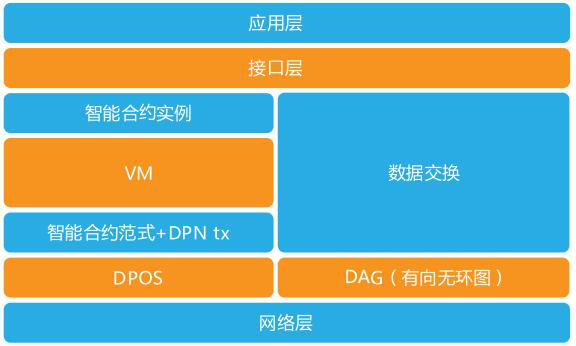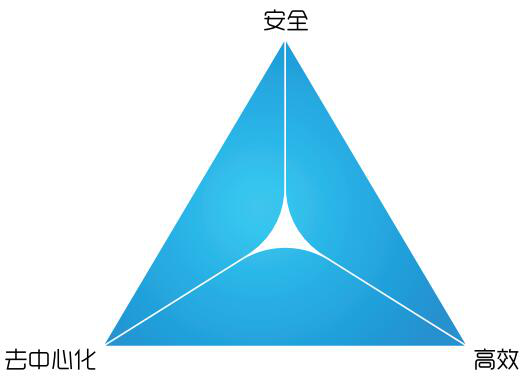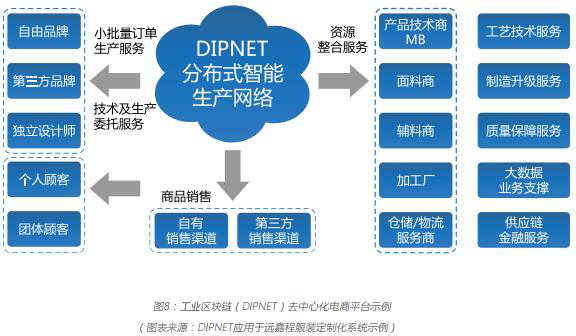-
Cryptocurrencies
-
Exchanges
-
Media
All languages
Project Overview
Industrial blockchain (DIPNET) is a smart contract platform for industrial manufacturing, providing complete implementation of underlying protocols, supporting tools, API interface sets, etc. The decentralization, security, anonymity and other advantages of blockchain technology have attracted a large number of traditional manufacturing companies, trying to reconstruct the way of enterprise value transfer and information transfer based on blockchain technology. Industrial blockchain (DIPNET) helps manufacturers easily enter the blockchain network by abstracting enterprise business flow into a smart contract paradigm, realizes the tokenization of business flow, and accelerates the flow of enterprise resources and information. Enterprises go to the chain, reconstruct the supply chain system with blockchain technology, and build a shared factory and decentralized e-commerce platform on this basis.
Project Highlights
Industrial blockchain (DIPNET) uses the mother-child double-chain model, and uses different consensus schemes for different production links in the industrial manufacturing field, taking into account reliability and performance. The Industrial Blockchain (DIPNET) project is an open source project, following the MIT protocol.
Infrastructure

Industrial blockchain (DIPNET) is mainly divided into:
Network layer: realize basic node discovery, data transmission and other functions.
· Basic service layer: realize transaction data, block generation, consensus maintenance, etc.
· Contract layer: realize smart contract paradigm and smart contract instance.
Interface layer: Provide external interfaces such as block data access and smart contract interaction.
(1) Network layer
The implementation of the devp2p protocol of Ethereum has been practiced by the Ethereum network for many years, and its privacy, robustness, performance and other aspects have been well verified. We will be based on the devp2p protocol of Ethereum (DPT, IPFS, etc.), realize the underlying network of the industrial blockchain (DIPNET).
(2) Basic service layer
Industrial blockchain (DIPNET) adopts the chained block structure of DPOS consensus. Later, as the number of transactions increases, it will eventually support DAG implementation at the same time, and transfer data that has nothing to do with payment. To the DAG sub-chain, and provide underlying support for IOT large-scale data.
The block service layer provides industrial blockchain (DIPNET) with services such as account management, organization of transactions, transaction verification, and block verification.
Industrial Blockchain (DIPNET) uses the ECDSA-secp256k1 digital signature scheme. Industrial blockchain (DIPNET) contains three account types:
Ordinary account
Contract paradigm account
Contract instance account
Among them, the ordinary account is controlled by the user's private key, and the contract paradigm account and Contract instance accounts are generated by specific algorithms. The block service layer accepts the parameters passed in from the upper layer, and can construct specific types of transaction data. After the transaction sender signs, the transaction broadcast is realized through the network layer.
For the transactions of the DPOS main chain and the DAG sub-chain, the industrial blockchain (DIPNET) will use different verification strategies. In particular, for DAG sub-chains, there is no concept of blocks.
(3) Contract layer
Industrial blockchain (DIPNET) implements smart contracts through VM. All contract paradigms and contract instantiation transactions are only allowed to be submitted on the main chain to ensure the timing and reliability of smart contracts. The contract paradigm is submitted by the developer, and the smart contract instance is initialized by the user through the contract paradigm. Smart contracts can directly access the data in the DAG. The contract layer is the core link to realize the industrial blockchain (DIPNET) business. The achievement of order intentions and order delivery are all automatically executed by smart contracts.
(4) Interface layer
The interface layer provides users and Dapp with access to the underlying block data, industrial blockchain (DIPNET) accounts, smart contracts, and contract paradigms. ) The main way of service interaction.
DPOS and DAG Double-chain Consensus
Choose a consensus solution, mainly from three aspects: security, decentralization, and robustness. These three constitute an impossible triangle.

The industrial blockchain (DIPNET) chooses the DPOS consensus mechanism to realize the parent chain. We believe that the DPOS consensus mechanism is a balance between efficiency, security and decentralization. Under the DPOS consensus, through the supervision of the super nodes by the community, it is ensured that most nodes are honest, and at the same time, higher efficiency and a simpler network structure are obtained.
Application Scenario
Digital Shared Factory
With the help of the de-intermediation trust mechanism brought by the blockchain technology and the advantages of multi-party synergy, the industrial blockchain (DIPNET) economic system will be the first to be applied In the field of capacity sharing in China's manufacturing industry.
According to the "China Manufacturing Capacity Sharing Development Report (2018)" released by the Sharing Economy Research Center of the National Information Center in February 2018, manufacturing capacity sharing mainly refers to the Internet platform as the basis, characterized by the sharing of use rights , A new economic form that integrates and allocates scattered manufacturing resources and manufacturing capabilities around each link of the manufacturing process, and maximizes the production efficiency of the manufacturing industry. In 2017, the market size of China's manufacturing capacity sharing market was about 412 billion yuan, an increase of about 25% over the previous year. The number of companies providing services through capacity sharing platforms exceeded 200,000, and the market size gradually expanded.
At the same time, many policy documents around the world have proposed to encourage the development of a manufacturing-oriented sharing economy, and the collaborative sharing platform, that is, the digital shared factory advocated by the industrial blockchain (DIPNET) will be an important solution.
The digital shared factory will rely on the cloud-chain hybrid industrial blockchain (DIPNET) economic system, fully consider technical feasibility, data security and cost controllability, and provide enterprises with different multi-party collaboration models.
The biggest difficulty in multi-party collaboration among factories lies in information security. Based on this, the industrial blockchain (DIPNET) economic system provides factories with blockchain encryption services of different security levels, and transfers important data between factories without intermediaries to ensure the encryption security of important production data.
In terms of factory internal management, mainly from the perspective of feasibility, the industrial blockchain (DIPNET) economic system provides mature industrial cloud technology, and cloud management of general production information can not only ensure maximum production efficiency, It can also reduce the production cost.
Decentralized e-commerce platform
After nearly 20 years of development, the e-commerce platform has formed roughly three important changes: 1: The e-commerce 1.0 model is "gathering people with goods" , the main features are abundant commodities, cheap prices and convenient payment, and the core of its model is "traffic"; the e-commerce 2.0 model is "gathering people with quality", and its main features are guaranteed quality, high delivery efficiency and high service quality, and its model The core is "quality"; the e-commerce 3.0 model is "gathering people by people", the main features are demand individuality, value matching and saving time and worry, and the core of its model is "personality".
Judging from the results of model changes, consumer-led market demand has become an important driving force for the transformation of e-commerce platforms. At present, high-end consumers around the world are turning to large-scale personalized needs, and it will be difficult for centralized e-commerce platforms to meet complex and diverse customization requirements, and it will also be difficult to achieve "on-demand design + quantitative production + zero turnover + zero Inventory + zero capital" business logic.
The decentralized e-commerce platform applying the industrial blockchain (DIPNET) economic system will rely on blockchain technology and digital shared factories to provide personalized users with a freely designed consumption platform and provide real and effective digital shared factories. Customized orders to achieve "on-demand design + quantitative production + zero turnover + zero inventory + zero capital" e-commerce 3.0.

Industrial blockchain (DIPNET) decentralized e-commerce platform has two important features:
Users' personalized needs are quickly met
In the industrial era, we have been using big data technology to mine user needs. The industrial blockchain (DIPNET) e-commerce platform will allow users to adapt to "products" Rather than businesses taking the initiative to change "products". By connecting multiple design parties and generating value output carriers based on design, users can self-select and design demos, add personal designs, and finally distribute orders through the DIPNET production network, and the back-end digital shared factory responds quickly.
The operating efficiency of the industry has been greatly improved
Since the on-demand production e-commerce platform uses the pre-sale model, it will not occupy capital costs, and funds can be circulated in more valuable places and more efficiently operation. After the consumer completes the pre-sale, the order is placed directly through the DIPNET production network to the digital shared factory, and the factory directly produces and delivers to the user according to the order, without intermediate links, resulting in a significant increase in the efficiency of the supply chain.
Scene Customization for the Film Industry
The industrial blockchain (DIPNET) economic system, which adheres to "one-click repeated customization", is committed to helping digital factories meet the fragmented needs of personalized consumers. The entertainment industry has obvious consumer-oriented attributes, but there is a relatively significant industrialization demand in China, which is one of the applicable application scenarios for the industrial blockchain (DIPNET) economic system.
Value Lifecycle Management
In the traditional Industry 4.0 system, Product Lifecycle Management (PLM) is an important part, and it is also an important direction for international companies such as Siemens to focus on. PLM takes the life cycle of products as the perspective, conducts closed-loop management of data in R&D, design, production, sales and other links, and realizes "data flow automation", which is the "end-to-end technology achievement" in the three major integrations of Industry 4.0.
Now, the industry 4.0 system is evolving to a more advanced stage, which is the value lifecycle management (VLM) with the industrial blockchain (DIPNET) technology as the core. VLM takes the life cycle of a product or an industrial chain value as a perspective, and conducts closed-loop management of data in the links of product value preparation, production, circulation, value-added, depreciation, and elimination to realize "value flow automation", which also belongs to the The category of end-to-end integration in the three major integrations of Industry 4.0 is only based on different perspectives.
Through VLM, enterprises can better manage logistics, information flow and value flow in a unified manner, token technology and digital factory technology can be better connected, financial technology and real economy will be deeply integrated, this is the future of industry, It is also the future of finance.











